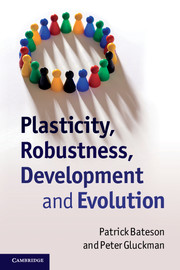Book contents
- Frontmatter
- Contents
- Preface
- Acknowledgements
- 1 Setting the scene
- 2 Clarifications
- 3 Developmental robustness
- 4 Plasticity
- 5 Integration of robustness and plasticity
- 6 Current function of integrated developmental processes
- 7 Evolution of developmental processes
- 8 Impact of developmental processes on evolution
- 9 Development and evolution intertwined
- References
- Index
1 - Setting the scene
Published online by Cambridge University Press: 05 August 2011
- Frontmatter
- Contents
- Preface
- Acknowledgements
- 1 Setting the scene
- 2 Clarifications
- 3 Developmental robustness
- 4 Plasticity
- 5 Integration of robustness and plasticity
- 6 Current function of integrated developmental processes
- 7 Evolution of developmental processes
- 8 Impact of developmental processes on evolution
- 9 Development and evolution intertwined
- References
- Index
Summary
An oak tree growing in a meadow has a relatively short trunk and a familiar structure of wide branching limbs that can easily be recognised. However, when oaks grow in forests they compete with each other and develop long straight trunks; they have an appearance that is totally different from the same species growing in open country. One of us, on a family holiday in Greece, collected two tiny seedlings of the Greek fir from a mountain on the island of Cephalonia. One seedling was planted in a garden in England and, 30 years later, is 15 metres high, growing fast and with a form just like the illustrations in tree books. The second was planted in an earthenware pot and is now a hundredth the size of the other – a perfect bonsai. Such capacity to respond dramatically to the available resources, however limited, and yet survive is also seen in those mammals in which large litters are commonplace. The runt in a litter of pigs might be a tenth of the weight of its siblings at birth, but it is perfectly formed and, if given sufficient milk after birth, will survive to become an adult, albeit of reduced size, that will be capable of breeding.
Nobody will be greatly surprised by these examples, and yet the ‘robustness’ of development – whereby the general characteristics of each individual develop in much the same way irrespective of the environment – is often contrasted with ‘plasticity’ or malleability, which allows change, particularly during early development.
Information
- Type
- Chapter
- Information
- Publisher: Cambridge University PressPrint publication year: 2011
